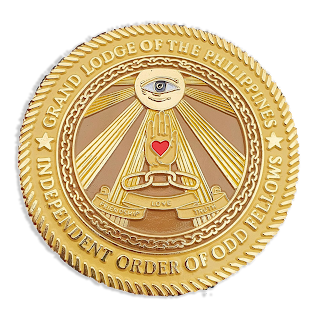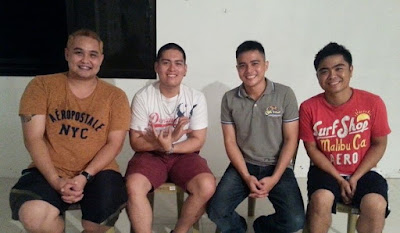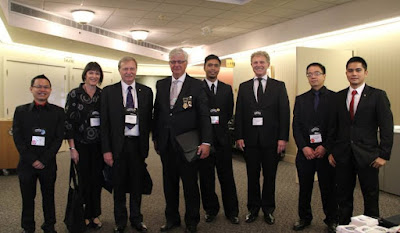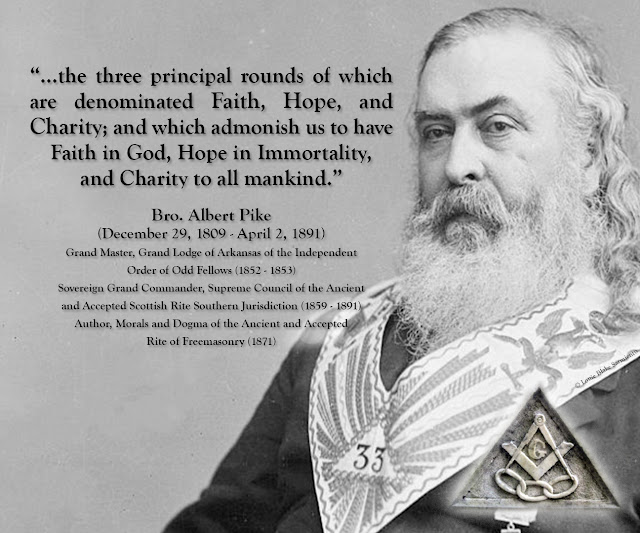REVIVAL OF ODD FELLOWS PHILIPPINES - A SOCIAL EXPERIMENT
THE REVIVAL OF ODD FELLOWS PHILIPPINES 12 YEARS AGO BEGAN AS A SOCIAL EXPERIMENT
By Louie Blake S. Sarmiento, M.A., J.D.
Many
of those who were instrumental in the revival were members of various
fraternities, sororities and even gangs. They, too, had previously participated
in the negative culture that many fraternities and sororities espoused. Somehow,
this core group reached a realization in life wherein they want to help change
all these bad public perceptions and revive the real beauty and purposes of
fraternal organizations with the following goals:
1.
To
re-introduce a morality or values-based initiation process without hazing,
violence, vices and other forms of subordination.
2.
To
create a bond where one’s worth is not based on his or her money,
fame, political influence or social rank and status in life.
3.
To form an egalitarian fraternal organization,
open for both men and women, and regardless of their nationality, race, gender,
political belief, religion or rank and status in life.
4.
To focus on character improvement
through volunteering in or organizing humanitarian projects and activities to
help people and communities in need.
But the goal was never to compete
with other fraternities and sororities. Instead, it is to serve as blue print in promoting positive changes within the fraternity system. It is to serve as an experimental
model that other fraternities and sororities may choose to follow. The focus was to build
a modest, diverse and service-oriented type of fraternity in the country that
will show the general public that fraternities and sororities can still be effective
social tools to make men and women better people and not the other way around. The
end-goal was to bring back public trust towards the fraternity system as an instrument
in developing good leadership and in promoting equality, righteousness and service
to society in general. But forming a new fraternity is challenging because that
will involve a lot of branding, promotion and organizational structuring. With
Industrial/organizational psychology concepts on mind, we used mergers and
acquisitions as a strategy. So, instead, the core group decided to merge the Watchdog
Committee (WDC) with the Independent Order of Odd Fellows (IOOF). WDC was just a modest inter-organization registered at Silliman University, mostly consisting of members representing various fraternities and sororities and organizations in Dumaguete City.
With
a history that goes back on or before the 1700’s in England, the Odd Fellows is
indeed one of oldest fraternal organizations in the world. This group was also
one of the first fraternal organizations to reach the Philippine Islands in
1872. When the Spanish-American War ended, the charter was officially issued on
June 29, 1902. The early membership counted military officers, governments
officials, lawyers and judges. Several Governor-Generals of the Philippines
were Odd Fellows. The organization even constructed their own headquarters in
1905, which they rented out to the Freemasons and Knights of Pythias. This was
also the largest fraternal organization in the world during the Golden Age of
Fraternalism (1870-1920), with a membership of over 3.9 million Odd Fellows and
1.2 million Rebekahs. The fraternal organization suffered greatly due to the
many socio-political events that occurred after the 1920’s. Sadly, the Odd
Fellows in the Philippines did not survive the ravages of World War II. The failure
to resume operations after the war was due to many factors but primarily because
of the two:
1.
Majority of the members were active military
officers and staff and government officials. Many of them died and became
prisoners during the war. Also, a number of them migrated to other countries
and never returned.
2.
The Odd Fellows used to provide its
members and families a clear and guaranteed set of financial benefits for sick,
disabled and deceased members. This was before the creation of the Social
Security System. The Great Depression during the 1930’s and World War II that
ended in the 1940’s resulted into a global financial crash that bankrupted or
almost bankrupted many Odd Fellows’ lodges and Grand Lodges. To resume
operations would mean that hundreds or thousands of wives and children of
deceased members would file a claim for benefits which the Lodges cannot afford
to pay.
As a fraternal organization, the Odd Fellows already had a very rich history, an internationally-shared values through its degrees of initiation and an established organizational structure. The Odd Fellows also remained to be one of the two remaining oldest and most widespread ancient fraternal organizations in the world - ranking next to Anglo-American or Regular Freemasonry. All other fraternal organizations of their age have already died-out or have very few remaining members and lodges today. Other fraternal groups with similar names exist as isolated Grand Lodges and Lodges that do not have any international recognition or formal connection with other worldwide associations. Moreover, the three remaining Orders of Odd Fellows still has more or less 600,000 members belonging in about 10,000 lodges located in over 34 countries. So, there was no other better option for a merger but with the Independent Order of Odd Fellows which became a realization when Watchdog Committee (founded in 1985) was chartered by The Sovereign Grand Lodge as "Watchdog Lodge No.1" on November 21, 2009.
The
beginning of the revival was full of hope as well as many challenges and mistakes.
It involved years of learning process. We even encountered criticisms and
bullying from other fraternal groups. But mostly ignored these at best. From
2009 to 2014, the Odd Fellows grew in terms of membership and finances. Most of
our lodges have rendered tens of thousands of volunteer hours for community service almost every weekend.
We have also raised over 12 million for relief projects and charities. By 2014,
we have raised enough funds to construct our first Odd Fellows building in
Dumaguete City, Philippines. For several years, the Odd Fellows consistently
became one of the top 10 organizations recognized by Silliman University.
The early success was mainly because there was teamwork, harmony and cohesiveness within the core group. None of the early core group competed for positions and control. We never thought about titles and ranks. We did not mind who gets the credit. We did not also control Odd Fellowship from others, we freely shared it by opening new lodges whoever will ask. We also did not mind criticisms and negativity, we only promoted positivity and on delivering good results. We never thought about filing charges or cases against other members whenever misunderstandings occur. We talk it out and move forward. Our finances grew for a period of time because we had a team of honest and open-minded individuals who used their intellect to conceptualize fund-raising strategies. None of the first core groups were pessimists, negative-thinkers or chronic complainers. Every idea was accepted and supported without having to question each other's motives. The level of open-mindedness and teachability of the early membership was contributory to why it was also easier to accomplish and deliver results. Our meetings were not about “small talks”, but rather focused on discussing "big" visions, ideas, goals and projects that we could possibly organize. None of us also thought of using lodge funds for our own personal benefit or selfish purposes. We even put more out of our own pockets and hearts because we sincerely believed in doing good for the sake of the greater good. Before we even started raising funds from outside sources, we registered as a non-stock corporation in 2012, opened a bank account named under the Odd Fellows, and made sure that there is proper recording and an Annual Financial Statement at the end of every year. None of the core group held the finances under their personal accounts and we had a system of checks-and-balances at least within the Odd Fellows in Dumaguete City. Our problem was when these funds reach individuals members and other lodges that are not SEC-registered. This is because we do not have legal supervision over them. We were not a national governing body or Grand Lodge but just a de facto set of officers who did whatever we can do for the benefit of all lodges in the country.
The triumph in surviving organizational infancy to adulthood was not because of one person. We do not have one sole founder. Rather, these are a product of the contributions of several people, which is very impossible to enumerate. Among them, credit to its early successes is due to brothers Rex Boyson Olpoc, Anatoly Karpov Buss, Armel Cabale, Kahlil Reyes, Cyril Jaymes Plantilla, Ivan Jason Delos Santos and Sidrake Arnold Mendez, as well as sisters Rena Vey Flores, Karmen Arenas and Maria Katrina Mercado. These members did not only think about our individual lodge in Dumaguete City but actually traveled to different places to help institute more lodges. Sisters Ivana Mae Canlas, Sheema Bajana, Corrine Faye Cornelia, Maria Christyriz Tolosa, Maelene Bastillada and Shiela Lyn Francisco also came into the picture to bring enthusiasm, camaraderie and community service. From other lodges, brothers Glenn Dimayuga, Apollo Neil Monroy, Kelvin Acebron, Paulo Pocholo Grande, McAldous Castanares, Jonathan Paulo, Kix Lagria, Aaron Ofngol, and sisters Genie Guimong+, Virginia Menguito, Adelfa Lustanas and Ella Peds were helpful in becoming the nucleus of what eventually became the “Grand Lodge of the Philippines, Independent Order of Odd Fellows.” These are the most dedicated Odd Fellows who stayed even during the most challenging times of the organizational development and change. Of course, there are many other active members who contributed and played their part whom I could wish will come back and see today's progress.
Progress became slow from 2015 to 2018 because internal management and re-organization became the main priority. We had to balance which best practices we have to adopt and which practices we have to throw-away from our observations with the Odd Fellows in North America, Europe, Australasia and the United Kingdom. Generally, the
core officers were focused on the internal improvements and the needed changes, as well
as the completion of the Odd Fellows building project in Dumaguete up until
2017. Some of the most dedicated members of the first core group also left the Philippines in order to work or study in the United States, Canada or Europe. But further expansion proceeded in 2019 when enthusiastic brothers from
Quezon City Lodge No.10 and Fraternitas Lodge No.11 (formerly Makati Lodge)
came into the picture and became instrumental in spreading Odd Fellowship
throughout Luzon. Today, there are more or less 1,700 initiated members
belonging to 34 chartered Lodges, 5 Encampments, 1 Rebekah Lodge and 3 Cantons
located in Luzon, Visayas and Mindanao. There are also about 9 petitioning
lodges to be instituted in due time.
But, like many other fraternal
organizations and service organizations, we are far from perfect. Sadly, our Grand Lodge had to expel
two members due to dishonesty and misappropriation of funds. Since we are
composed of human beings with different personalities, we are also not free
from misunderstandings and conflicts. Joining other fraternal groups had also resulted into
some friction between a few of our members and lodges. Our Grand Lodge had to
suspend some members to regain harmony and avoid distraction from its priorities. This means that there are still more improvements that needs to be
done. There are still many mistakes and failures that we all can learn from. This means that we are still far from being truly successful in "improving and elevating the character" of our membership. But our continuous success and further improvement will not depend on our Grand
Lodge officers and Lodge officers alone, this will have to depend on each and
every member. The Grand Lodge is not above you, rather, you -- all
members and Lodges -- are the Grand Lodge of the Philippines! To be a better fraternal organization, we need your dedication, help, skills, knowledge and wisdom.
With all these past accomplishments
and points for improvement on mind, may I humbly conclude by encouraging everyone to work together in
creating a fraternal environment where brothers and sisters act and behave as
true friends to each other. No organizational politics. No competition for
titles, power or control. No inner cliques. No factions. No negativity. No back-biting.
No jealousy. No hatred. No dishonesty. No pretentious. No taking advantage of
others. Instead, let us focus on harmoniously supporting and uplifting each
other up. Understanding and accepting each other for who they really are.
Forgiving and asking forgiveness when making mistakes. And genuinely helping
each other and our communities in times of need. If we can do all these simple
goals, we will indeed help make this world a better place to live.




























thank you for posting
ReplyDelete